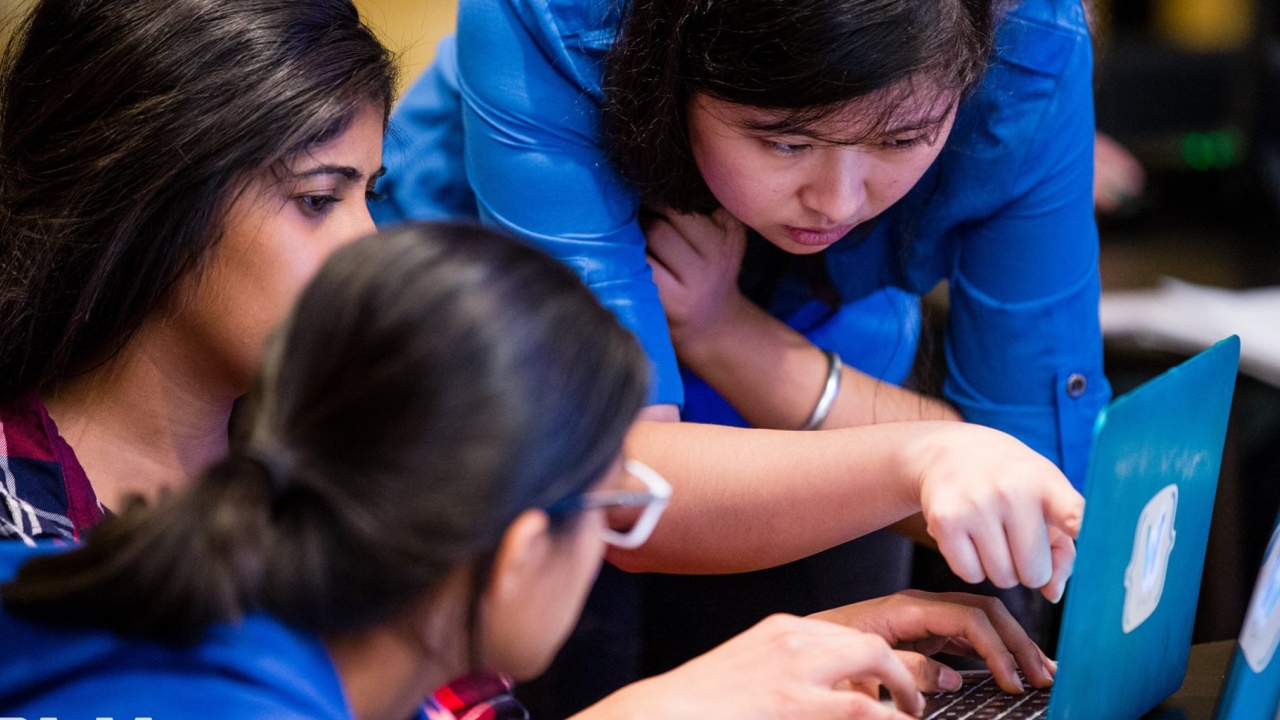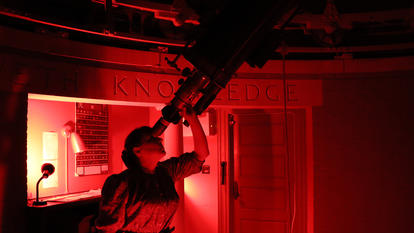WHACK Hackathon Combines Innovation and Social Good

Imagine a phone app that could help visually impaired students navigate Wellesley’s campus. Now imagine that you and a few of your peers have just have 30 hours to create it.
That’s the kind of challenge participants faced at the WHACK (meaning Wellesley hacks) hackathon held in Tishman Commons on October 1 and 2, hosted by Wellesley’s computer science club.
While most college hackathons—technical innovation marathons where projects ideas are designed and implemented—emphasize competition and attract predominantly male students, WHACK creates a supportive environment for women, beginners, and other minorities in technology. The club’s recent event—its eighth in three years—emphasized learning and experimentation, as always, as well as a theme of hacking for social good.
Organizers Grace Hu ’17 and Amanda Foun ’17, both computer science majors, worked with Boston nonprofits Uplift, Inc. and Partners In Health, and with Wellesley’s Office of Disability Services, to identify specific needs in the areas of education, accessibility, and health and wellness.
The 80 participants—around 70% of them women, an atypically high representation for hackathons—attended from colleges and universities all along the East Coast. Teams worked to create a project that would solve a problem the nonprofits provided, such as “create a tool that educates the public about online harassment and violence” or “improve education about how to behave when encountering people who are differently abled.”
“Hackathons are a great way to explore CS outside of the classroom, and our goal is to give participants the confidence that they can create really cool projects,” said Hu, who became interested in computer science in high school, thanks to a friend who’d built several mobile apps. “I think there is a great interest in hacking in a supportive environment, where the focus is on learning and is supportive of minorities and women in technology.”
For many participants, the chance to create innovative projects and to work with dedicated mentors was the best takeaway from the event. WHACK surpassed a student-to-mentor ratio of 4:1, which included mentors from the event’s 15 corporate sponsors. The teams were assisted throughout the two-day event by 25 mentors from top companies including Microsoft, Cisco, and the New York Times, as well as Wellesley computer science professors Eni Mustafaraj Sohie Moody Lee, and Scott Anderson.
“The point of a hackathon is to try out new technology you have never used before, and mentors help participants do that,” said Foun, who chose to major in computer science as a sophomore because of the support and encouragement she received from faculty. “Grace and I really focused on making sure that every team had a mentor working with them the whole time.”
Many participants coded or programmed until 4 am, then started again after a short nap. The mentors, including alumnae Ali Pierson ’13 and Sahitya Raja ’15, also put in long hours, with some staying until 11 pm or later and returning early the next morning.
By the end of the weekend, the teams had created several unique projects, including Smile for Me, an interactive game that highlights the microaggressions that women often face; Access Squared, an app that tracks the Wellesley Access van; and Anti-Troll Harassment Checker, a Google Chrome extension that checks for misogynistic, racist, or homophobic text on websites.
Each team was judged by a panel of four mentors on technical difficulty, creativity, and potential impact, and prizes were given in various categories, including best accessibility hack, best health hack, best education hack, and best rookie hack.
A team of three rookies from Wellesley (Anna Farell-Sherman ’19, Claire Beyette ’19, and Scarlett Se Yun Cheon ’19) won three awards—the overall first prize, best accessibility hack, and the rookie award—for Welcome Home, Wellesley, a phone app that would tell visually impaired users their exact location on campus. The team is now developing a prototype, which relies on Bluetooth beacons to get accurate location data and is working with the computer science department and Disability Services to install the system in parts of Clapp Library sometime next semester. (More beacons must be purchased to allow for full implementation in the building.)
Jacqueline Young ’18, a computer science major whose team won the best harassment hack prize, said her team’s mentor gave them thoughtful insights—and her email address. “Her encouraging us to reach out to her meant that she was committing to continuing her mentorship outside the hackathon, potentially for the rest of our careers.”



